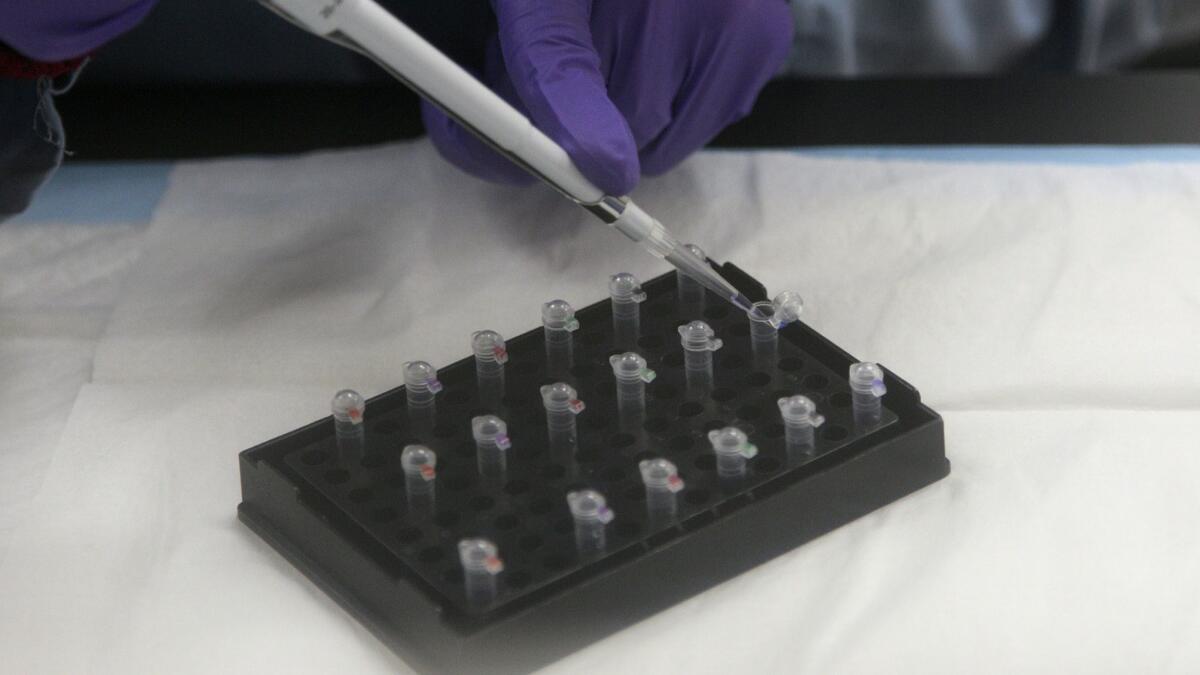Editorial: A DNA decision undermines Californians’ privacy and their presumption of innocence

- Share via
In 2013, the U.S. Supreme Court upheld a Maryland law requiring police to collect DNA samples from people who had been arrested and charged with serious crimes — samples that could then be stored in a database and used to solve unrelated crimes. In a dissenting opinion, the late Justice Antonin Scalia accused the court’s majority of undermining the 4th Amendment’s ban on “searching a person for evidence of a crime when there is no basis for believing the person is guilty of the crime.”
Critics of a similar California law hoped that the California Supreme Court, applying the state Constitution’s separate ban on unreasonable seizures and searches, would show more respect for privacy and the presumption of innocence. On Monday, the court failed to do so — leaving in place a system in which an arrestee’s DNA can end up in a database in perpetuity even if he or she is ultimately not charged or acquitted.
This law allows police to conduct genetic fishing expeditions. The court should have struck it down.
By a 4-3 vote, the California court turned aside a challenge to Proposition 69, a measure enacted by the voters in 2004 that requires police to obtain a DNA sample from everyone arrested on suspicion of a felony — not just those who are ultimately found guilty. The court rejected the appeal of Mark Buza, who refused to submit to a DNA swab after he was arrested in San Francisco in 2009 on suspicion of arson. Buza was convicted of arson-related felonies, but also of the misdemeanor of refusing to supply his DNA.
Writing for the majority, Justice Leondra R. Kruger said that the DNA law “may raise additional constitutional questions that will require resolution in other cases.” Still, this decision is a huge disappointment. It means that police will continue to be able to store and search the DNA profiles of tens of thousands of Californians who were arrested but never charged or convicted.
Some might ask: What is wrong with that? If the result is that an arrestee’s profile matches DNA found at the scene of an unsolved crime, why would that be a bad thing? Closing such “cold cases,” after all, is the real reason for laws such as this.
But does that justify lumping the innocent in with the guilty? Some cold cases would also be resolved if the police were able to compel every citizen — not just people who were arrested — to have the inside of their mouths swabbed for DNA. For instance, submitting to a cheek swab might be required of everyone applying for a driver’s license or voting in an election.
Most Californians, we suspect, would protest against this idea even if it did lead to the identification and conviction of some criminals. They would argue, plausibly, that innocent people shouldn’t be subjected to such an invasion of privacy.
But people who are arrested but not charged or convicted are also presumed innocent in the eyes of the law. It’s one thing to subject people who have been found guilty of a crime to the violation of privacy that DNA collection entails, in the hope that their genetic profile will help solve some other crime. After all, people convicted of crimes forfeit much of the privacy (and liberty) that other citizens enjoy. But people who have been merely arrested shouldn’t have to bear that burden.
California’s law recognizes this reality by providing a mechanism for people who have been arrested but not charged or convicted to petition for the removal of their DNA profile from the database. But, unlike the Maryland law upheld by the U.S. Supreme Court, California’s law doesn’t provide for automatic destruction of the DNA sample if the arrestee is cleared of felony charges. In most cases, an exonerated person must file a written request for expungement. That’s outrageous.
Kruger’s opinion didn’t resolve objections to the expungement process. A different plaintiff presumably could still challenge that process.
Even with its qualifications, Monday’s decision leaves in place a system that Justice Goodwin Liu in his dissenting opinion called a “biological dragnet” that violates the California Constitution.
The decision also could offer encouragement to those who want to make the dragnet even wider. For example, Assemblyman Jim Cooper (D-Elk Grove) has proposed that police collect the DNA of people convicted of (although not merely arrested on suspicion of) simple drug possession and other misdemeanors that could have been charged as felonies before voters passed Proposition 47 in 2014.That’s a bad idea.
DNA evidence has obviously been a boon for the investigation of crime. In some circumstances, police clearly should be able to obtain such evidence. For example, even in the absence of Proposition 69, a suspect accused of a rape could be served with a warrant based on probable cause requiring him to submit to a DNA test that might link him to that crime. But this law allows police to conduct genetic fishing expeditions. The court should have struck it down.
Follow the Opinion section on Twitter @latimesopinionand Facebook.
More to Read
A cure for the common opinion
Get thought-provoking perspectives with our weekly newsletter.
You may occasionally receive promotional content from the Los Angeles Times.






